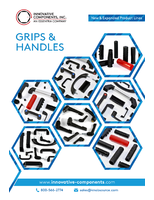Differential Pressure Gages offer rated accuracy of ±2%.
Press Release Summary:

High Static Pressure Differential Gauges are available in Piston, Rolling Diaphragm, Small Convoluted Diaphragm, and Convoluted Diaphragm types. Configurations include 2, 2½, 3½, 4, 4½, and 6 in. dials with aluminum or 316 stainless steel wetted parts. Rolling Diaphragm Gauge can be used in pressures to 100 psid, while Small Convoluted Diaphragm Gauge is suitable for pressures to 60 psid.
Original Press Release:
High Static Pressure Differential Gauges
Winters Instruments introduces the new High Static Pressure Differential Gauges to their existing premium pressure gauge product line. There are four types of High Static Pressure Differential Gauges including Piston Type, Rolling Diaphragm Gauge, Small Convoluted Diaphragm Gauge and Convoluted Diaphragm Gauge.
These pressure gauges come in various configurations including 2" (50mm), 2 ½" (63mm), 3 ½" (90mm), 4" (100mm), 4 ½" (115mm), and 6" (150mm) dials with aluminum or 316 stainless steel wetted parts. The High Static Pressure Differential Gauges offer a high degree of accuracy +/- 2%.
The Piston Type Gauge is most suitable for general use/all purpose applications. It uses a piston with Teflon cap as a sensor to separate high and low pressure in response to pressure differentiation.
The Rolling Diaphragm Gauge operates on rolling diaphragm as sensor, which separates high and low pressure ports. Recommended for air and gas applications or where zero migration of fluid between high and low ports is important. Used in high line pressure and differential pressure ranges up to 100 psid.
Small Convoluted Diaphragm Gauges operate on a convoluted diaphragm as a sensor, which separates high and low pressure ports. Recommended for air and gas applications. Used for high line pressure and differential pressure ranges up to 60 psid.
Convoluted Diaphragm Gauges operate on convoluted diaphragm sensor with differential pressure ranges 2-200 inches of water. Used where comparatively low line pressure and sensitivity to small changes in differential pressure is important.
For more information on High Static Pressure Differential Gauges, please visit the website at www.winters.com, or contact Winters Instruments at marketing@winters.com.




